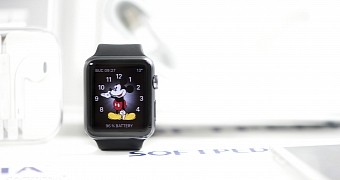Apple is expected to take the wraps off its next-generation smartwatch in the coming months, possibly in September, when the company is unveiling the iPhone 7, and now a new report provided by Bloomberg comes to confirm that GPS will almost certainly be offered on the device.
But while a GPS sensor makes sense on the second-generation Apple Watch, there’s something a little bit more interesting coming from the same source (which cites people with knowledge of the matter, so we should take this with a healthy amount of skepticism since nobody can tell if it’s accurate info or not).
Basically, Apple wanted the new Watch to come with carrier support, which means that the company planned to make it possible to use the device just like a smartphone and have data coverage wherever you go. This obviously would have created lots of new possibilities for the Watch, and since it already comes with a microphone and a speaker, making it possible to use it as a smartphone kind of made sense.
Apple worked with carriers on this feature
But it turns out that Apple has actually hit some roadblocks in its attempt to create an LTE-connected smartwatch, and Bloomberg says that it was all because of battery life worries.
Specifically, Apple wants the second-generation Watch to come with a battery that lasts longer than on the first model, but that’s quite a big challenge, given the fact that it’ll also offer a GPS sensor - GPS is usually the biggest battery hog on wearables, so Apple needs to offer a bigger battery and state-of-the-art optimizations to deal with this.
And by coming up with LTE support on the Apple Watch 2, the company would have had another reason to worry about when it comes to battery life, and it appears that Cupertino actually decided to hold back this feature for a future model after getting in touch with several carriers.
Of course, nobody can tell for sure when cellular support could land on the Apple Watch, but for the moment, it becomes more obvious that the second generation won’t have it.

 14 DAY TRIAL //
14 DAY TRIAL //